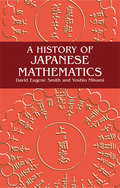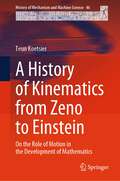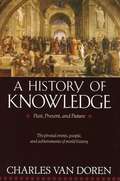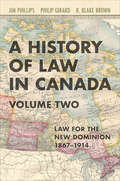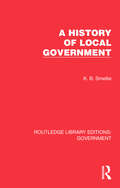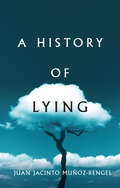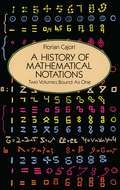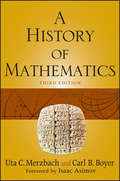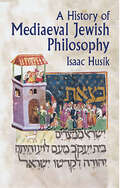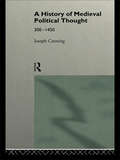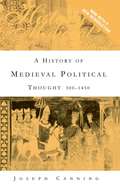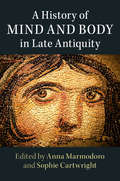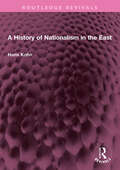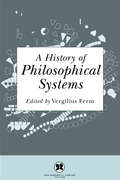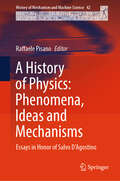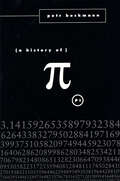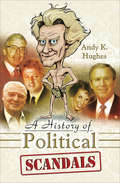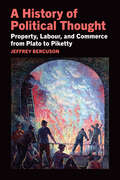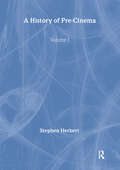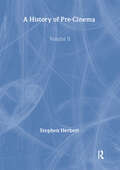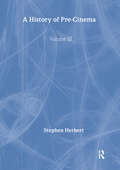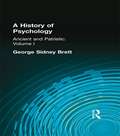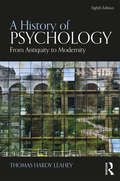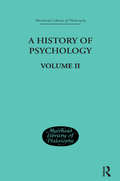- Table View
- List View
A History of Japanese Mathematics (Dover Books on Mathematics)
by David E. Smith Yoshio MikamiOne of the first books to show Westerners the nature of Japanese mathematics, this survey highlights the leading features in the development of the wasan, the Japanese system of mathematics. Topics include the use of the soroban, or abacus; the application of sangi, or counting rods, to algebra; the discoveries of the 17th-century sage Seki Kowa; the yenri, or circle principle; the work of 18th-century geometer Ajima Chokuyen; and Wada Nei's contributions to the understanding of hypotrochoids. Unabridged republication of the classic 1914 edition. 74 figures. Index.
A History of Kinematics from Zeno to Einstein: On the Role of Motion in the Development of Mathematics (History of Mechanism and Machine Science #46)
by Teun KoetsierThis book covers the history of kinematics from the Greeks to the 20th century. It shows that the subject has its roots in geometry, mechanics and mechanical engineering and how it became in the 19th century a coherent field of research, for which Ampère coined the name kinematics. The story starts with the important Greek tradition of solving construction problems by means of kinematically defined curves and the use of kinematical models in Greek astronomy. As a result in 17th century mathematics motion played a crucial role as well, and the book pays ample attention to it. It is also discussed how the concept of instantaneous velocity, unknown to the Greeks, etc was introduced in the late Middle Ages and how in the 18th century, when classical mechanics was formed, kinematical theorems concerning the distribution of velocity in a solid body moving in space were proved. The book shows that in the 19th century, against the background of the industrial revolution, the theory of machines and thus the kinematics of mechanisms received a great deal of attention. In the final analysis, this led to the birth of the discipline.
A History of Knowledge: Past, Present, and Future
by Charles Van DorenA one-volume reference to the history of ideas that is a compendium of everything that humankind has thought, invented, created, considered, and perfected from the beginning of civilization into the twenty-first century. Massive in its scope, and yet totally accessible, A HISTORY OF KNOWLEDGE covers not only all the great theories and discoveries of the human race, but also explores the social conditions, political climates, and individual men and women of genius that brought ideas to fruition throughout history. "Crystal clear and concise... Explains how humankind got to know what it knows." Clifton Fadiman.
A History of Law in Canada, Volume Two: Law for a New Dominion, 1867–1914 (Osgoode Society for Canadian Legal History)
by R. Blake Brown Philip Girard Jim PhillipsThis is the second of three volumes in an important collection that recounts the sweeping history of law in Canada. The period covered in this volume witnessed both continuity and change in the relationships among law, society, Indigenous peoples, and white settlers. The authors explore how law was as important to the building of a new urban industrial nation as it had been to the establishment of colonies of agricultural settlement and resource exploitation. The book addresses the most important developments in the seventeenth, eighteenth, and nineteenth centuries, including legal pluralism and the co-existence of European and Indigenous law. It pays particular attention to the Métis and the Red River Resistance, the Indian Act, and the origins and expansion of residential schools in Canada. The book is divided into four parts: the law and legal institutions; Indigenous peoples and Dominion law; capital, labour, and criminal justice; and those less favoured by the law. A History of Law in Canada examines law as a dynamic process, shaped by and affecting other histories over the long term.
A History of Local Government (Routledge Library Editions: Government)
by K. B. SmellieOriginally published in 1946, this book traces the essential changes in structure, areas and in the relations between local and central authorities in England from 1832 to the Education Act of 1944. Modern English local government has developed from the industrial and scientific revolution and the growth of political democracy since 1832 and the present system is the result of an interplay between political, economic and scientific factors. The book contains a stand-alone chapter on London government and an introductory chapter on the condition of local government between 1689 and 1832.
A History of Lying
by Juan Jacinto Muñoz-RengelWherever there is life, there are lies. Slick-suited politicians lie on the podium, ready to tell voters what they want to hear. Cheating lovers, swindling businessmen, double-crossing villains – all liars. But nature lies too – the cheetah crouching in the tall grass waiting to pounce, its spots and straw-coloured fur blending in with its surroundings, the chameleon with its adaptable skin, the octopus hiding in its cave. Juan Jacinto Muñoz-Rengel uncovers the slippery history of lies, some dark and elusive, others thunderous and dazzling. From primeval forests to modern politics, he explores the uncomfortable truths of our white lies, fudged facts and blatant deceptions. For centuries, philosophers, writers and poets have grappled with the paradox of what&’s fact and what&’s fiction. So who can we really believe? Our friends? Our partners? Our leaders? Can we even trust ourselves? Truly, this is the only book in which the abundance of lies on its pages is a sign of success. Or maybe it isn&’t. Who can really tell?
A History of Mathematical Notations: Two Volumes Bound as One
by Florian CajoriThis classic study notes the first appearance of a mathematical symbol and its origin, the competition it encountered, its spread among writers in different countries, its rise to popularity, its eventual decline or ultimate survival. The author's coverage of obsolete notations -- and what we can learn from them -- is as comprehensive as those which have survived and still enjoy favor. Originally published in 1929 in a two-volume edition, this monumental work is presented here in one volume.
A History of Mathematics (History Of Mathematics Ser. #Vol. 2)
by Carl B. Boyer Uta C. MerzbachThe updated new edition of the classic and comprehensive guide to the history of mathematics For more than forty years, A History of Mathematics has been the reference of choice for those looking to learn about the fascinating history of humankind’s relationship with numbers, shapes, and patterns. This revised edition features up-to-date coverage of topics such as Fermat’s Last Theorem and the Poincaré Conjecture, in addition to recent advances in areas such as finite group theory and computer-aided proofs. Distills thousands of years of mathematics into a single, approachable volume Covers mathematical discoveries, concepts, and thinkers, from Ancient Egypt to the present Includes up-to-date references and an extensive chronological table of mathematical and general historical developments. Whether you're interested in the age of Plato and Aristotle or Poincaré and Hilbert, whether you want to know more about the Pythagorean theorem or the golden mean, A History of Mathematics is an essential reference that will help you explore the incredible history of mathematics and the men and women who created it.
A History of Mediaeval Jewish Philosophy
by Isaac HusikA noted scholar elucidates the distinguishing characteristics of the works of several Jewish thinkers of the Middle Ages. In addition to summaries of the main arguments and teachings of Moses Maimonides, Isaac Israeli, Judah Halevi, Abraham Ibn Daud, Hillel ben Samuel, Levi ben Gerson, and others, the author offers insightful analyses.
A History of Medieval Political Thought: 300–1450
by Joseph CanningIncorporating research previously unavailable in English, this clear guide gives a synthesis of the latest scholarship providing the historical and intellectual context for political ideas. This accessible and lucid guide to medieval political thought * gives a synthesis of the latest scholarship* incorporates the results of research until now unavailable in English* focuses on the crucial primary source material* provides the historical and intellectual context for political ideas. The book covers four periods, each with a different focus: * 300-750 - Christian ideas of rulership * 750-1050 - the Carolingian period and its aftermath* 1050-1290 - the relationship between temporal and spiritual power, and the revived legacy of antiquity* 1290-1450 - the confrontation with political reality in ideas of church and of state, and in juristic thought. Canning has produced an ideal introductory text for undergraduate and postgraduate students of the period.
A History of Medieval Political Thought: 300–1450
by Joseph CanningFirst Published in 2005. Routledge is an imprint of Taylor & Francis, an informa company.
A History of Mind and Body in Late Antiquity
by Anna Marmodoro Sophie CartwrightThe mind-body relation was at the forefront of philosophy and theology in late antiquity, a time of great intellectual innovation. This volume, the first integrated history of this important topic, explores ideas about mind and body during this period, considering both pagan and Christian thought about issues such as resurrection, incarnation and asceticism. A series of chapters presents cutting-edge research from multiple perspectives, including history, philosophy, classics and theology. Several chapters survey wider themes which provide context for detailed studies of the work of individual philosophers including Numenius, Pseudo-Dionysius, Damascius and Augustine. Wide-ranging and accessible, with translations given for all texts in the original language, this book will be essential for students and scholars of late antique thought, the history of religion and theology, and the philosophy of mind.
A History of Nationalism in the East (Routledge Revivals)
by Hans KohnFirst published in 1929, A History of Nationalism in the East brings together in one truly fascinating volume a mass of information hitherto scattered and partly unavailable. Hans Kohn sums up the general situation in his Introduction. He tells us that the World War I produced three great communities of interest, distinct and, to some extent, mutually antagonistic. The first was that of the continent of Europe, barring Russia, which was faced with the necessity for the gradual breaking down of national boundaries, for political, financial, and economic reasons. The second was that of the Anglo-Saxon people, the United States, Great Britain, Canada, Australia, and South Africa. This had to face Soviet Russia on the one hand, and the Oriental, the third, community of interests on the other. Here he sketches suggestively the development of the nationalist movement in Islam, India, Egypt, Turkey, Arabia, and Persia. The language used is a reflection of its era and no offence is meant by the Publishers to any reader by this republication. This book will be of interest to students of history, political science, international relations, and geography.
A History of Palliative Care, 1500-1970: Concepts, Practices, and Ethical challenges (Philosophy and Medicine #123)
by Michael StolbergThis book on the history of palliative care, 1500-1970 traces the historical roots of modern palliative care in Europe to the rise of the hospice movement in the 1960s. The author discusses largely forgotten premodern concepts like cura palliativa and euthanasia medica and describes, how patients and physicians experienced and dealt with terminal illness. He traces the origins of hospitals for incurable and dying patients and follows the long history of ethical debates on issues like truth-telling and the intentional shortening of the dying patients' lives and the controversies they sparked between physicians and patients. An eye opener for anyone interested in the history of ethical decision making regarding terminal care of critically ill patients.
A History of Philosophical Systems
by Vergilius FermEditor Vergilius Ferm brings together the theories of over forty-one prominent philosophers in this well-organized and thoughtful overview of philosophical systems. You'll find compelling entries from each school of thought including Buddhist and Christian philosophies, Positivism, Phenomenology, Evolution, and more. This text, which includes the work of philosophers from ancient Greece all the way up to twentieth-century thinkers, is the perfect companion to any serious student of philosophy. Vergilius Ferm is the author of several reference titles in philosophy, including Dictionary of Pastoral Psychology and A History of Philosophical Systems. He taught at the College of Wooster, where he served as the head of the Department of Philosophy.
A History of Physics: Essays in Honor of Salvo D'Agostino (History of Mechanism and Machine Science #42)
by Raffaele PisanoThe book gathers several contributions by historians of physics, philosophers of science and scientists as new essays in the history of physics ranging across the entire field, related in most instances to the works of Salvo D'Agostino (1921-2020), one of the field's most prominent scholars since the second half of the past century. A phenomenon is an observable measurable fact, including data modelling, assumptions/laws. A mechanical phenomenon is associated to equilibrium/motion. Are all mechanisms mechanisms of a phenomenon? Scholars with different backgrounds discuss mechanism/phenomena from an historical point of view. The book is also devoted to understanding of causations of disequilibrium (shock, gravitational, attraction/repulsion, inertia, entropy, etc.), including changes/interaction in the framework of irregular cases of modern physics as well. The book is an accessible avenue to understanding phenomena, ideas and mechanisms by leading authorities who offer much-needed historical insights into the field and on the relationship Physics–Mathematics. It provides an absorbing and revealing read for historians, philosophers and scientists alike.
A History of Pi
by Petr BeckmannThe history of pi, says the author, though a small part of the history of mathematics, is nevertheless a mirror of the history of man. Petr Beckmann holds up this mirror, giving the background of the times when pi made progress -- and also when it did not, because science was being stifled by militarism or religious fanaticism.
A History of Political Scandals: Sex, Sleaze And Spin
by Andy K. HughesA must-have guide to the scandalous behavior of politicians around the world. Andy Hughes&’s fascinating book guides us through centuries of political abuse—and just plain stupidity. This pocket guide exposes the secret side of politics, including politicians who risked or ruined their own careers for personal gain. Stories include the MP who liked to party hard and be whipped even harder; the prime minister and his hookers; expenses claims for manure; and the US president who called for all gay men to be castrated. Politicians have mixed scandal with eggs, adult movies, helicopters, drugs, shoes, beef burgers, public toilets, mobile phones, rape, turkeys, orgies, and even ice cream. And it&’s not just today&’s politicians who are embroiled with scandal. This explosive book reveals the questionable behavior of politicians of yesteryear from around the world.
A History of Political Thought: Property, Labor, and Commerce from Plato to Piketty
by Jefferey BercusonA History of Political Thought is an accessible introduction to the history of political and economic thought; its main focus is the rise, and eventual consolidation, of modern market society. It asks: What are the effects of private property and commerce on individual well-being and on the stability of the political community? A History of Political Thought answers this central question through the careful study of political philosophers and economists, from ancient Greece to the twenty-first century. The book does not have an ideological agenda and gives equal voice to thinkers on opposite sides of the political spectrum. This is one of its key merits and a mark of distinction: its willingness to treat stark opponents – Hobbes and Locke, Smith and Marx, Keynes and Hayek, among others – as equally worthy of serious study. In doing so, the book provides students with a very powerful arsenal of ideas about the evolution of the market and also provides a solid introduction to the history of political thought.
A History of Pre-Cinema V1
by Stephen HerbertFirst published in 2004. This set of 3 volumes collects together for the first time rare and scattered material on the history of pre-cinema. It includes articles on stereoscopic photography; the use of kaleidoscopes; optical illusions; theatre design; magic lanterns and mirrors; shadow theatre, and much more. The articles are taken from sources such as The Magazine of Science, The Art Journal, The British Journal of Photography, Scientific American, American Journal of Science and Arts, and The Mirror. Volume 1 includes the areas of Camera Obscura to Chronophotography and Optical Toys and Devices Magic Mirrors.
A History of Pre-Cinema V2 (Routledge Library Of Media And Cultural Studies)
by Stephen HerbertFirst published in 2004. This set of 3 volumes collects together for the first time rare and scattered material on the history of pre-cinema. It includes articles on stereoscopic photography; the use of kaleidoscopes; optical illusions; theatre design; magic lanterns and mirrors; shadow theatre, and much more. The articles are taken from sources such as The Magazine of Science, The Art Journal, The British Journal of Photography, Scientific American, American Journal of Science and Arts, and The Mirror. Volume 2 includes the areas of Peepshows, panoramas and dioramas; Mirror projection, shadows, magic lanterns; and Various optical devices and effects.
A History of Pre-Cinema V3 (Routledge Library Of Media And Cultural Studies)
by Stephen HerbertFirst published in 2004. This set of 3 volumes collects together for the first time rare and scattered material on the history of pre-cinema. It includes articles on stereoscopic photography; the use of kaleidoscopes; optical illusions; theatre design; magic lanterns and mirrors; shadow theatre, and much more. The articles are taken from sources such as The Magazine of Science, The Art Journal, The British Journal of Photography, Scientific American, American Journal of Science and Arts, and The Mirror. Volume 3 includes the area of Movement in Two Dimensions- a study of the animated and projected pictures which preceded the invention of cinematography.
A History of Psychology: Ancient and Patristic Volume I
by George Sydney BrettFirst published in 2002. Routledge is an imprint of Taylor & Francis, an informa company.
A History of Psychology: From Antiquity to Modernity
by Thomas Hardy LeaheyA History of Psychology places social, economic, and political forces of change alongside psychology’s internal theoretical and empirical arguments, illuminating how the external world has shaped psychology’s development, and, in turn, how the late twentieth century’s psychology has shaped society. Featuring extended treatment of important movements such as the Enlightenment and the Scientific Revolution, the textbook approaches the material from an integrative rather than wholly linear perspective. The text carefully examines how issues in psychology reflect and affect concepts that lie outside the field of psychology’s technical concerns as a science and profession. This new edition features expanded attention on psychoanalysis after its founding as well as new developments in cognitive science, artificial intelligence, and behavioral economics. Throughout, the book strengthens its exploration of psychological ideas and the cultures in which they developed and reinforces the connections between psychology, modernism, and postmodernism. The textbook covers scientific, applied, and professional psychology, and is appropriate for higher-level undergraduate and graduate students.
A History of Psychology: Mediaeval and Early Modern Period Volume II
by George Sydney BrettFirst published in 2002. Routledge is an imprint of Taylor & Francis, an informa company.
